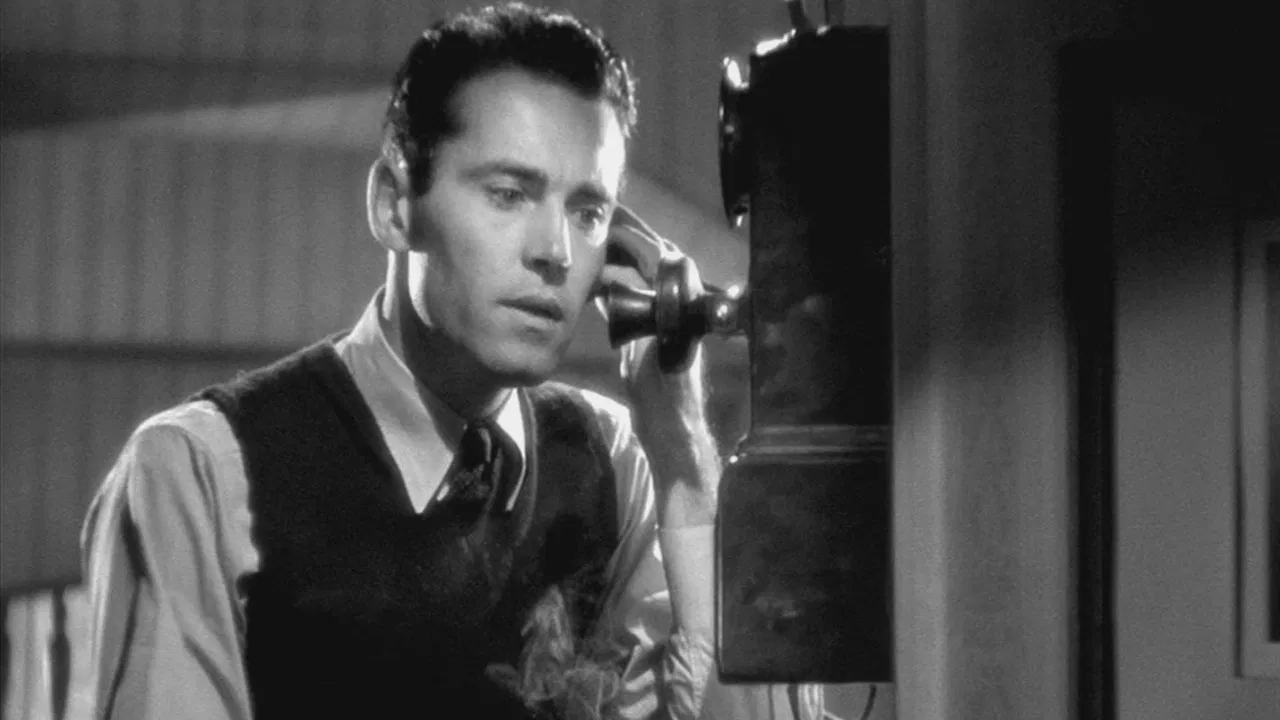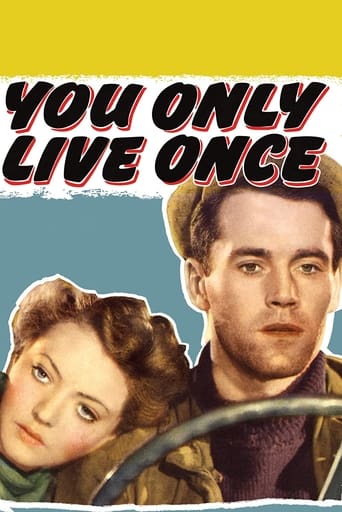Supelice
Dreadfully Boring
Kirandeep Yoder
The joyful confection is coated in a sparkly gloss, bright enough to gleam from the darkest, most cynical corners.
Ortiz
Excellent and certainly provocative... If nothing else, the film is a real conversation starter.
Staci Frederick
Blistering performances.
a_baron
This is quite a well known film with Henry Fonda playing three time loser Eddie Taylor. Much of the plot is improbable, indeed the prison bust-out is Fantasy Island stuff because even in the 1930s security for a man under sentence of death in the United States was an order of magnitude stronger than depicted here, but this is a film that was clearly produced as a social document as much as for entertainment. Eddie Taylor is a most unappealing character, one whom even an actor of Fonda's stature cannot inject with empathy, added to which if he'd had so much as a shred of decency he would never have dragged down his girl with him, would probably not have married her in the first place. Nevertheless, the question remains, how does society deal with even the repentant habitual criminal? Seventy and more years on, little if anything has been done to address that problem, certainly in America with its enormous prison population and the continued destruction of unskilled jobs which reduce almost to nothing the prospects of the underclass – criminal or otherwise – of making an honest living.
dougdoepke
Not a movie to see if you're feeling depressed. Arguably, this is the darkest entry in the doomed lovers genre, and also one of the most affecting. Three-time loser Eddie (Fonda) and his pregnant wife (Sidney) are on the run after killing a priest, and after Eddie has tried his best to go straight in the face of a hostile, uncaring society. As the fog closes in, the tender couple tries to make their way to the border and freedom. What they get instead is freedom of a different kind.Anyone doubting that cinema is basically a medium of manipulation needs to examine this grim masterpiece of early noir. From an irresistibly tearful Sidney to an unyielding fate to a relentlessly bleak photography, we're caught up in Lang's carefully crafted artistic vision. The parts fit together inexorably, driving the lovers and us toward an inevitable conclusion. The only visual missing is an onrushing train. In my book, the movie's one of the purest examples of how visual artistry can overcome plot contrivance, for there are an unfortunate number of the latter.Too bad the sad-faced Sidney is largely forgotten. It's really her marvelously expressive range that registers the tragedy and moves the audience. Far from glamorous, her talent remains nonetheless unusually poignant. All in all, the movie's in the same league as the transcendent They Live By Night (1947), and stands as possibly the polar opposite of the giddy Bonnie And Clyde (1967). In my little book, it's Lang's most compelling American film, despite the relative obscurity.
secondtake
You Only Live Once (1937)Ah, to see such a simple, moving, constantly changing drama with a criminal undertone (or overtone) is a treat. This isn't quite from the Warner Brother heyday in the early 1930s, where the form was established and made dark and really fast. But this is pre-film noir, strictly speaking, forming a bridge between the two worlds. In fact, like Stagecoach two years later, this is a daring William Wanger production, going out on a limb, and using brilliant German director Fritz Lang for an essentially American drama.The innocent man fighting for his life, the loving woman who will do anything to help, the evil or doubtfully trustworthy authorities of every kind, the kindly defense lawyer, and the priest, all are archetypes used before but mixed together with brilliance. If there is a clunky moment or two, there is just one or two, and the whole thing is mostly bracing and quite beautiful. It's also a fairy tale, of sorts, the kind of moral fable where you sort of know the ending but don't mind because it's point is so beautiful.Henry Fonda is here presaging his famous "breakout" roles in "Jezebel," "Young Mr. Lincoln," and "Grapes of Wrath," and his love-interest, Sylvia Sidney, is known for a role she had just finished in "Sabotage." Both are spot on perfect. And as their involvement goes through some surprises, it turns into a kind of "They Live by Night," which you should also see. The whole idea of two people in love against the world, which doesn't understand them, is as poignant and lasting as it gets, and Lang, whatever his usual dark sentiments, lets this part of it shine through, too.
ALauff
In this doomed love story of an ex-con (Henry Fonda) trapped in a world that won't forgive or forget and the woman (Sylvia Sidney) unconditionally bound to him, Lang sees the criminal potential in everyone, from the neighborhood cop who swipes apples from an immigrant fruit-seller, to the station attendants who exploit the couple's gunpoint gasoline theft for a payday of their own, to the guards who leer over Henry Fonda's supine form as it awaits escort to the chair. The whole world is on trial, and found guilty. Heroes and villains are splintered into categories of those who are punished for their crimes unto mortal eternity, and those who persist in petty, under-the-table wrongdoings within society's aegis. In the former category are the protagonists: Eddie, just notified of his exoneration from bogus murder charges, kills the kindly priest in a moment of disbelieving panic; Jo leaves her baby behind to prolong the adventure of a fugitive romance. Prior to these events, Eddie endeavors to go straight and set up a homestead, but his attempts to reform are blocked at every turn by exploiters and busybodies who forbid his dream of a quiet, quotidian existence. His life is reduced to the confines of a spare room, existence an unending rebuke. Lang empathizes with Eddie and Jo not because of their purity—anathema to Lang's worldview—but because of their faith in one another, which transcends the human birthrights of petty malfeasance and self-interest.The film's structure is dauntingly clear yet purposeful, provocatively reenacting one crucial decision in order to illustrate the immutability of Eddie's fate. Following a rain-soaked bank robbery—one of several violent, weather-determined setpieces; here, Lang rhymes a wipe edit with the getaway car's flattening of a cop—all evidence points to Eddie's involvement in the crime, which resulted in six casualties. Innocent but determined to flee the fourth-strike rule and certain death, Eddie equivocates just long enough to be apprehended. His jailbreak on the eve of execution is punctuated by his first murder, necessitating his going on the lam—an initially voluntary choice recast as mandatory destiny. Innocence leads to a death sentence; guilt leads to literal death. A miracle is offered, but it arrives when he's distracted, at his most hopeless. And death becomes all, as an outcome of running and not running—living is the farthest idea from mind.But it's living, Lang finally expresses, even at its most miserably futile, that affords grace. Jo resurrects Eddie from his boxcar tomb with exhortations to live for as far as roads will take them, perhaps all the way to border freedom. Those back roads open up to country vistas, Eddie's predominant mode of physical confinement recedes, and life is simplified to necessities of the moment. This serene spartan outlook radiates through the film's last scenes, as Eddie and Jo suffer their last trial, as Eddie gazes off inscrutably from a hilltop, still trying to elude his pursuers. Piercing through this tragedy is the return of the once-unnoticed miracle: Eddie's moment of grace revealed as deliverance from humanity's mudded reflection into spotless rebirth. At once a relieved affirmation of the film's title—i.e., the Langian notion that in death we will all one day blissfully escape mankind's stark judgments—and stunning evidence of a heretofore unseen Christian sensibility, Eddie's contented exodus from a damned life gives the priest the last word: death is renewal.

